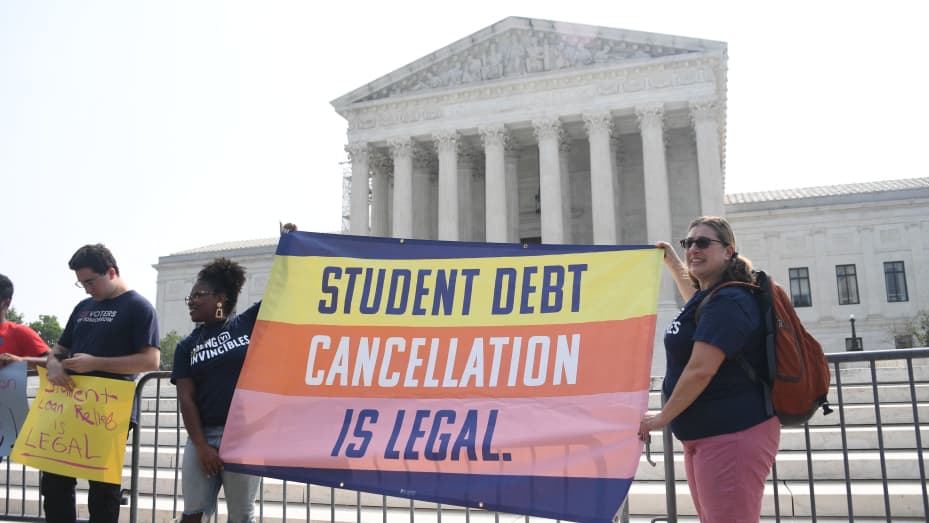By John F. Di Leo, Opinion Contributor
Joe Biden feigned shock when the Supreme Court ruled that he had no authority to wipe out tens of billions of dollars in student loans at the stroke of a pen.
The issue is so clearcut, it’s hardly imaginable that we could need to explain it, but let’s begin with that part, to be thorough.
Millions of people knowingly, willingly signed onto student loan debts, often while studying for degrees in fields that are well-known for producing relatively low-paying jobs. And then, when they found these burdens to be high after college, they hoped that politicians would let them off the hook. Some of those politicians, including Joe Biden, did in fact promise to do so. Even so, the voices reminding the electorate that nobody had such power, and it couldn’t possibly happen were so loud, nobody could claim to have heard Biden’s promise without hearing everyone else’s corrections.
Nobody, certainly nobody purporting to be highly educated, has grounds for claiming otherwise.
Once Joe Biden was installed in the Oval Office, he and his staff decided to issue a blanket forgiveness of up to $20,000 per loan – with no limit on how many such loans per borrower, by the way. As soon as they did so, both judicial and legislative processes were begun to stop this illegal overreach, and eventually, in fact, it was stopped, as it had to be.
The executive branch simply does not have the authority – nor should it – to force the taxpayers of America to absorb the debts of their neighbors.
There is no provision in the law – not in the Constitution, not in the Heroes Act, not in the establishment of the Departments of Education or Treasury – nowhere – that would or could give a White House such power.
There are good reasons for this:
· A nation cannot allow a person running for nationwide office to have the power to literally give five and six figure presents to every voter who votes for him.
· The economic destruction of having the federal budget sustain such a hit – well over $40 billion in this case alone – is so severe that to do it would logically require the specific authorization of Congress.
· Such a concept obviously must not be undertaken unless the conditions that caused it are addressed first; no revamps of the student loan system and the higher education funding process (a massive undertaking) have even been begun.
· Worst of all is the moral hazard involved. “Forgive” this class of loans (which really means transferring the obligation to others, not eliminating it), and it invites further hits to the system, across the board. What’s the difference between college loans, car loans, home loans and even credit card debt, for that matter?
The thing that gives people pause in taking on any expensive debt is the fact that they will have to pay it back or face bankruptcy, with all the shame and lifestyle restrictions such a result involves. Remove that risk, and borrowers instantly become reckless, endangering not just the banking system, but every aspect of the economy.
Already, the Biden-Harris regime is talking about pushing other ways to absolve the borrowers of their legal obligation to repay the bills. They have no interest in considering an environment in which the borrowers do indeed pay back their own loans.
So that leaves it to the rest of us.
What’s the real issue here? It’s not that this level of debt is objectively unaffordable for the vast majority of borrowers. These people all manage loans of $20,000 to $50,000 for automobiles; $200,000 to $1.5 million for houses and condos. And many manage business loans to cover even larger amounts as they build their empires.
So, the vast majority of them can afford $40,000 or even $100,000 in loans; there’s just something about student loans that causes a lot of borrowers to deprioritize them. Why?
Why do people think their student loans aren’t as gripping an obligation as all these others? Perhaps because they have been told, for years, maybe for their entire lives, that higher education is a racket, that they’re being cheated, so, rather than beat themselves up over having unwisely accepted these obligations, they beat up the banks that trusted them when they asked for financing.
An odd psychosis, and possibly worthy of psychological study. But it doesn’t change the fact that they have these debts, that these debts are real, and legitimate. So, if we don’t want to just wish them away – and as the judiciary and the legislature have reminded us, we just can’t – then we should concentrate on how to help them pay off these bills.
And that’s easily solved.
Just help them earn more.
That’s not as flippant a statement as it may seem. If you earn $50,000 per year, then $20,000 is 40 percent of your salary. But if you earn $100,000, then it drops to only 20 percent of your year’s salary.
Double that to a $200,000 salary, and $20,000 becomes just 10 percent of it.
“But it will take me years for my salary to skyrocket like that,” you say. And that’s true. But every year your income is growing, those payments become more affordable.
The important thing is to get on track for those salary increases. The important thing is for your career to be escalating.
Part of this is about individual responsibility, ambition, and willpower. If a person doesn’t respect an obligation, he won’t try as hard to fulfill it. If he does respect it, he’ll do what it takes: work longer hours, apply for promotions, take on part-time jobs and consulting work.
But part of it, to be fair, is that many types of advancement have been artificially restricted over the past 30 years or so, as American manufacturing has rapidly moved abroad. With less expansion and new business growth than there could have been, thanks to tepid GDP growth, people stay in their roles longer, waiting longer and longer for openings in the next tier, whether it be managers moving up to director, directors moving up to vice president, or plant managers moving up to CEO.
As was demonstrated during the economic booms of the Reagan and Trump administrations, the right pro-growth policies – lower taxes, deregulation, energy abundance, and government spending restraint – will always produce economic growth.
And as these graduates earn an ever-better living, the excuses for nonpayment of their student loans drift away.
But what of those who chose majors that don’t naturally lead to well paying jobs in their preferred majors?
No problem, there’s an answer to that too.
In a growth economy, one can get a good job in a worthwhile field even if it’s miles from the subject matter of one’s college degree. Companies will hire the Sociology major, the English major, the Linguistics major – because when they need buyers in Purchasing and A/P clerks in Finance and customer service reps in Sales, and there aren’t enough of those majors to go around because of the economic boom, their standards will drop and the people with silly, pointless or just less business-focused majors will luck out at last and get worthwhile jobs.
If every business has “Help Wanted” signs up, nobody’s going to feel sorry for someone who just won’t apply for anything.
Excuses drift away when there’s an economic boom.
Maybe that’s why the Democratic Party is always doing its best to prevent one.
Copyright 2023 John F. Di Leo
John F. Di Leo is a Chicagoland-based trade compliance trainer and transportation manager, writer, and actor. A one-time county chairman of the Milwaukee County Republican Party, he has been writing regularly for Illinois Review since 2009. Follow John F. Di Leo on Facebook, Twitter, Gettr or TruthSocial.
A collection of John’s Illinois Review articles about vote fraud, The Tales of Little Pavel, and his 2021 political satires about current events, Evening Soup with Basement Joe, Volumes One and Two, are available, in either paperback or eBook, only on Amazon.
Don’t miss an article! Use the tool on this page to sign up for Illinois Review’s free email notification service, so you always know when Illinois Review publishes new content!








